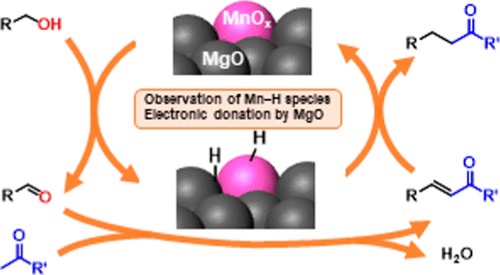

Materials for pharma/agrochems:アルコールからケトン合成!
synthèse de cétones à partir d’alcool !
Synthese von Ketonen aus Alkohol!
synthesis of ketones from alcohol!
從酒精中合成酮!
ーマンガン触媒、東工大が開発 ー
東京工業大学
科学技術創成研究院
フロンティア材料研究所
原教授10月7日、
アルコールから、医農薬品原料の「ケトン」を合成した。
「マンガン触媒」の開発に成功した。
米国化学会刊行の触媒作用に関する学術誌「ACS Catalysis」に掲載された。
医薬品や農薬の原料:
医薬品や農薬、サプリメントの原料となるのは、ピロール類やキノリン類だ。
「パラジウム、ルテニウムなどの貴金属」を触媒として、製造される。
そのため、製造コストが高くなっている。
パラジウムやルテニウム:
パラジウムやルテニウムなど、貴金属は埋蔵量が少ない。
また触媒構造の複雑さから、触媒材料のリサイクルも容易ではない。
代替触媒材料の開発:
「マンガンや鉄など、ユビキタスで安価な金属」が貴金属代替材料として注目されている。
原教授ら研究チーム:
「バイオマスに含まれるアルコールの変換反応」において、
「MgOが顕著な促進効果を示すこと」を報告した。
今回、
「このMgOの促進効果をマンガン触媒に適用すること」で、
「アルコールの炭素–酸素結合」を、「炭素–炭素結合に変換可能なこと」を確かめた。
その結果、実際に変換可能なことを解明した。
「医薬品・合成中間体であるピロール類やキノリン類の合成」に成功した。
今回の成果:
研究チームでは、
- マンガン、
- マグネシウム、
- アルミニウムを触媒として用いることで、
「有機化合物から有用な有機化合物」を、少工程数・低コストで合成できる。
TECH+
https://news.mynavi.jp/techplus/article/20221011-2478325/
Matières premières pour la pharmacie et l’agrochimie : synthèse de cétones à partir d’alcool !
ー Catalyseur au manganèse développé par Tokyo Tech ー
Institut de technologie de Tokyo
Institut de recherche innovante
Laboratoire des matériaux frontières
Professeur Hara
7 octobre,
A partir d’alcool, nous avons synthétisé des cétones, qui sont des matières premières pour la pharmacie et l’agrochimie.
A réussi à développer un catalyseur au manganèse.
Il a été publié dans ACS Catalysis, une revue académique sur la catalyse publiée par l’American Chemical Society.
Matières premières pour la pharmacie et l’agrochimie :
Le pyrrole et la quinoléine sont des matières premières pour les produits pharmaceutiques, les produits chimiques agricoles et les suppléments.
Il est fabriqué en utilisant des “métaux précieux tels que le palladium et le ruthénium” comme catalyseurs.
Les coûts de fabrication sont donc élevés.
Palladium et Ruthénium :
Les réserves de métaux précieux tels que le palladium et le ruthénium sont rares.
De plus, du fait de la complexité de la structure du catalyseur, il n’est pas aisé de recycler le matériau catalyseur.
Développement de matériaux catalyseurs alternatifs :
Les « métaux omniprésents et peu coûteux tels que le manganèse et le fer » attirent l’attention en tant que substituts de métaux précieux.
Professeur Hara et son équipe de recherche :
Dans “Réaction de conversion de l’alcool contenu dans la biomasse”,
Il a été rapporté que “MgO montre un effet promoteur remarquable”.
cette fois,
En appliquant cet effet promoteur du MgO aux catalyseurs au manganèse,
Nous avons confirmé que “la liaison carbone-oxygène de l’alcool” peut être “convertie en une liaison carbone-carbone”.
En conséquence, nous avons précisé que la conversion est effectivement possible.
A réussi la synthèse des pyrroles et des quinoléines, qui sont des produits pharmaceutiques et des intermédiaires de synthèse.
Réalisations cette fois :
L’équipe de recherche
manganèse,
magnésium,
En utilisant l’aluminium comme catalyseur,
Il est possible de synthétiser des “composés organiques utiles à partir de composés organiques” avec un petit nombre d’étapes et à faible coût.
TECH+
Rohstoffe für Pharmazeutika und Agrochemikalien: Synthese von Ketonen aus Alkohol!
ー Mangan-Katalysator Entwickelt von Tokyo Tech ー
Technisches Institut Tokio
Institut für innovative Forschung
Labor für Grenzmaterialien
Professor Hara
7. Oktober,
Aus Alkohol haben wir Ketone synthetisiert, die Rohstoffe für Pharmazeutika und Agrochemikalien sind.
Es gelang ihm, einen Mangankatalysator zu entwickeln.
Es wurde in ACS Catalysis veröffentlicht, einer wissenschaftlichen Zeitschrift zur Katalyse, die von der American Chemical Society herausgegeben wird.
Rohstoffe für Pharmazeutika und Agrochemikalien:
Pyrrol und Chinolin sind Rohstoffe für Arzneimittel, Agrochemikalien und Nahrungsergänzungsmittel.
Es wird unter Verwendung von “Edelmetallen wie Palladium und Ruthenium” als Katalysatoren hergestellt.
Daher sind die Herstellungskosten hoch.
Palladium und Ruthenium:
Vorräte an Edelmetallen wie Palladium und Ruthenium sind knapp.
Darüber hinaus ist es aufgrund der Komplexität der Katalysatorstruktur nicht einfach, das Katalysatormaterial zu recyceln.
Entwicklung alternativer Katalysatormaterialien:
„Allgegenwärtige und preiswerte Metalle wie Mangan und Eisen“ ziehen als Edelmetallersatz die Aufmerksamkeit auf sich.
Professor Hara und sein Forschungsteam:
In “Umwandlungsreaktion von in Biomasse enthaltenem Alkohol”,
Es wurde berichtet, dass “MgO eine bemerkenswerte fördernde Wirkung zeigt”.
diesmal,
Indem man diese fördernde Wirkung von MgO auf Mangankatalysatoren anwendet,
Wir haben bestätigt, dass „die Kohlenstoff-Sauerstoff-Bindung von Alkohol“ „in eine Kohlenstoff-Kohlenstoff-Bindung umgewandelt werden kann“.
Als Ergebnis haben wir klargestellt, dass eine Konvertierung tatsächlich möglich ist.
Erfolgreich bei der Synthese von Pyrrolen und Chinolinen, die Pharmazeutika und synthetische Zwischenprodukte sind.
Erfolge diesmal:
Das Forschungsteam
Mangan,
Magnesium,
Durch die Verwendung von Aluminium als Katalysator
„Nützliche organische Verbindungen aus organischen Verbindungen“ lassen sich mit wenigen Schritten und kostengünstig synthetisieren.
TECH+
Inexpensive, Reusable Mn Catalysts Make for Efficient Alkylation of Ketones With Alcohols
Tokyo Institute of Technology
A newly developed manganese (Mn) catalyst facilitates efficient conversion of alcohols into diverse organic compounds without requiring the addition of a base and producing water as the only byproduct,
Tokyo Tech researchers
find in a new study.
The Mn catalysts are inexpensive, reusable,
do not require large energy for waste treatment, and demonstrate product yields as high as 92%.
Tokyo Tech News
https://www.titech.ac.jp/english/news/2022/065051
Heterogeneous Low-Valent Mn Catalysts for α-Alkylation of Ketones with Alcohols through Borrowing Hydrogen Methodology
ACS Catalysis
Abstract
Alcohol transformations through the borrowing hydrogen (BH) methodology
have attracted attention due to its high atom economy and substrate availability.
Nonprecious metal heterogeneous catalysts have recently been extensively explored;
however,
the difficulty in the observation of the active metal species has prevented mechanistic studies.
Here,
we report on supported Mn catalysts that act as reusable heterogeneous catalysts
for the construction of C–C bonds by the α-alkylation of ketones with alcohols through the BH methodology.
The catalyst,
a Mn2+ species-MgO mixture-deposited Al2O3 support (Mn-MgO/Al2O3),
exhibits catalytic performance for the reactions to give the corresponding products in 50–92% yield.
The present catalyst did not require the addition of homogeneous strong bases
that are typically indispensable for these reactions using the reported Mn-based heterogeneous catalysts
and that require large energy consumption for separation, recycling, and waste treatment.
While the addition of bases to such reaction systems has been considered to accelerate the dehydrogenation of alcohols and/or aldol condensation,
MgO in Mn-MgO/Al2O3, a heterogeneous base,
does not contribute to these steps.
Fourier transform infrared spectroscopy (FT-IR) measurements indicated not only the incorporation of Mn hydride species,
which has never been observed on heterogeneous Mn-based catalysts by the dehydrogenation of alcohols,
but also enhancement of the hydrogenating capability of the Mn hydride species by co-deposited MgO on Al2O3.
While such hydride species had been found to accelerate direct amination of alcohols over a metallic Ru nano particles-MgO mixture,
the present study reveals that the reaction mechanism is extended to α-alkylation of ketones with alcohols over oxidized Mn, a base metal, in contact with MgO.